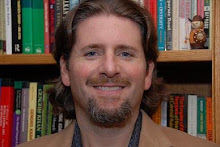I recently gave a reading from my book The Many Faces of Sacha Baron Cohen: Politics, Parody, and the Battle over Borat at my local cultural hotspot, the Green Planet Coffee Co. in Point Pleasant Beach, NJ. During the hour-long event, the only question that really gave me pause and I found trouble answering to my satisfaction was “Is Sacha Baron Cohen a racist?” I want to make clear that my trepidation derives not from a failure to explore this question. In fact, whether or not he is a racist has been a central aspect of my research for years.
Back in 2007, I asked his dissertation advisor at Cambridge, Tony Badger, if he thought his former student was a racist. Badger replied: “How you interpret that form of satire is very much a matter of personal taste or definition of humor. Particular audiences respond in different ways. I never detected a semblance of racism in him. Actually, this is not strong enough. There is no evidence of Sacha Baron Cohen being racist. No one can see a racist intent in the humor. Everything about him was consistent with an anti-racist orientation. The $64,000 question here is about the danger of parody when one takes ludicrous or extremist view or approach. This has been a problem for humorists forever. He faces it now. That sort of humor lends itself to criticism and contestation.”
While this eloquent defense of Baron Cohen should be taken at face value—along with his participation in and advocacy of activist organizations like the Anti-Racist Alliance (ARA)—as evidence that he is not a racist, I believe the answer to the question remains ambiguous. This stems from my audience’s response to my paraphrasing of the above quote and references to Baron Cohen’s personal campaign against racism. In a world where image is everything, one’s personal performances and personae trump who you “really” are. Therefore, even if he is not racism and his humor is, then that is what matters. The discussion about Baron Cohen purported racism continued after the reading at a gathering at my home. Hoping to parry responsibility for fulfilling what I knew was quickly becoming an impossible task, I begin to turn the question around on my interrogators, asking them—in good political science fashion—to provide me with their definition of the concept of ‘racism’. Not surprisingly, the responses were mixed. This prompted me to do a bit research.
According to Merriam-Webster, racism is a platform or dogma based on “the assumption that psychocultural traits and capacities are determined by biological race and that races differ decisively from one another which is usually coupled with a belief in the inherent superiority of a particular race and its right to domination over others.” A bit too vague for my tastes, but, by this definition, we can affirm at least the possibility that Baron Cohen is a racist (though proving it is another matter entirely).
W. Thomas Schmid in his 1996 essay “The Definition of Racism” renders racism as “the infliction of unequal consideration, motivated by the desire to dominate, based on race alone.” Using this behavioral definition, one can argue that Sacha Baron Cohen is not a racist—either in his portrayal of blacks (or—as Ali G is rather indefinable—other minorities) or in his larger comedic project. Schmid’s definition mirrors others which make subordination the explicit characteristic of racism. If there is no power, then there is no racism.
Joseph Barndt, in Dismantling Racism (1991) is more parsimonious in his definition: “Racism is prejudice plus power.” He later refined his definition to read “racial prejudice” plus the “misuse of power.” Needless to say, Sacha Baron Cohen is powerful. In March 2007, GQ ranked him as the 19th-most powerful man in Britain. This put the comedian one place behind Prince William and only two spots behind the country’s Conservative Party leader, David Cameron. In the words of GQ editor Darius Sanai, “Not since John Lennon has an English entertainer had such an effect on the world . . . George Bush was briefed on him, the Kazakh government briefed against him and the film Borat . . . hit the No. 1 spot in America last autumn.” Now to another question: Is he prejudiced? First, this query leads us to another definition (ah, concepts, concepts everywhere). According to Gordon Allport, author of The Nature of Prejudice (1954), prejudice is bias expressed through negative or positive opinions towards individuals based on the group in which one mentally places them. Bingo! My research proves that at least on some level, Baron Cohen is prejudiced. But then again, who isn’t? We all engage in some level of positive or negative group-based presupposition about the people we meet. Therefore, it all comes down to the misuse of that power.
Like it or not, Baron Cohen’s Ali G shtick is racist. It is a mockery of whites pretending to be black. Ali G has pre-judged a certain group of whites and uses his mass-mediated power to subordinate them by making them look the fool. And that is just fine by me.
Subscribe to:
Post Comments (Atom)

No comments:
Post a Comment